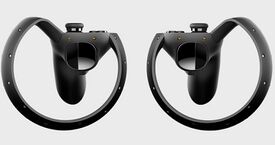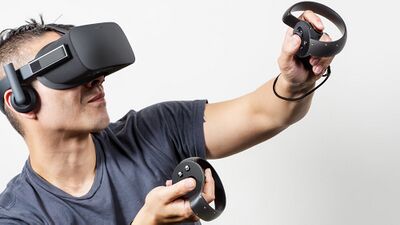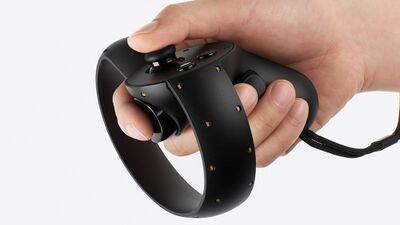Oculus Touch

| |
|---|---|
| Developer | Oculus VR |
| Operating System | Windows, Mac, Linux |
| Image | |
| Optics | |
| Tracking | 6DOF |
| Rotational Tracking | IMUs |
| Positional Tracking | Oculus Sensor |
| Input | Analog stick, 2 buttons, 2 triggers, hand gestures |
Oculus Touch also known as the Half Moon is the first unique Input device for the Oculus Rift. Acting as your hands in the virtual world, Oculus Touch consist of two mirror-image controllers, one held in each hand. These wireless controllers are motion tracked by the same Constellation tracking system that tracks the Rift HMD. Oculus Touch has traditional gamepad controls such as analog stick, buttons and triggers along with the abilities to detect hand gestures and provide haptic feeback.
Release and Prices[edit]
Current Prices[edit]
On October 11, 2017, during the Oculus Connect 4, Hugo Barra, Oculus' Vice President of Virtual Reality, announced the permanent price reduction of Oculus Rift and Touch bundle to $399.
On March 1, 2017, price of Touch was reduced to $99 and additional sensor cost $59. Note that Touch comes with 1 Oculus Sensor.
Price History[edit]
In July 2017, the price of Oculus Rift CV1 bundled with Oculus Touch was reduced to $499. Note that the bundle does not come with the Xbox 360 Controller nor the Oculus Remote, but it does come with 2 Oculus Sensors.
Oculus Touch was revealed alongside Oculus Rift CV1, on June 11, 2015 during Oculus VR's Pre-E3 Special Live Event. Reservation for Touch began on January 6, 2016 with the pre-order of the Rift. Oculus Touch will release on December 6, 2016 for $199. With pre-orders starting on October 10, 2016.
Touch ships with an Oculus Sensor for 360 degrees VR experience. Additional sensor can be purchased from $79 for Room-scale VR experience.
Features[edit]
- Hand presence - the sense of your virtual hands are the same as your natural hands. Your hands are tracked with accuracy and low latency.[1]
- Manipulation - precise manipulation of virtual objects. For example, user can pick up a gun, fire it then discard it without having to think about it.[1]
- Low mental load - instinctively interact with objects in VR. Use the controllers effortlessly like how you use your real hands in the real world.[1]
- Communicative gestures - hand gestures are detected. Gestures such as pointing, waving and giving the thumbs up are useful for social interactions.[1]
- Transitional inputs - gamepad inputs such as analog stick, buttons and triggers. These time-tested input methods allow traditional gaming experiences to fuse with new VR experiences.[1]
- Lightweight - lightweight and ergonomic, easy to get into and out of. The controller has to be comfortable for long periods of usage.[1]
Hardware[edit]
Traditional Controls[edit]
One wireless Oculus Touch is held in each hand. 2 Oculus Touch controllers are designed to operate simultaneously. Some of the controller's features are similar to that of a traditional gamepad. It has 1 analog stick and 2 buttons on top and 2 triggers, 1 for the index finger located in front and 1 for the middle finger on the side. Additionally, the controller features capacitive sensing. Every input on the device, besides the side trigger, can sense the user's touch.
Tracking[edit]
Oculus Touch achieves high precision, low latency, 6DOF tracking through the same Constellation tracking system as the Rift headset. IR LEDs are placed on the controllers' bodies and rings, allowing them to be tracked by the same positional tracking sensor(s) that tracks the HMD. The LEDs on the outer rings prevent occlusion caused by your hands. In addition to positional tracking, controllers possess built-in IMUs that allow rotational tracking.
Gesture Sensing[edit]
The gadget has a matrix of sensors mounted inside that keep track of your fingers and detect hand gestures. The only 2 fingers that the controller do not detect are the pinky and the ring finger.
Ergonomics[edit]
You grip the controller similar to how you shake someone's hand. Your thumb is placed on top of the controller and handles the analog stick and 2 buttons. Your index finger is placed in front and is responsible for a trigger there. Your other 3 fingers grip the handle of the controller with your middle finger responsible for a trigger on the side.
When you hold the controller, your hand is in a comfortable natural resting position. When you grab something or pick something up in VR, you activate the side trigger with your middle finger and grip of your hand becomes tighter. It simulates the natural motion of grasping an object in real life.
Specifications[edit]
Battery - 30 hours without haptics and 20 hours with haptics on a removable and rechargeable AA battery.
Apps[edit]
Bundled Titles[edit]
First Contact - 80s sci-fi throwback tutorial app that shows the player how to use Touch.
Oculus Medium - 3D sculpting tool.
Oculus Quill - painting tool.
Toy Box - Oculus Rift's internal testing app used to design Oculus Touch and experiment with new features. It is a multiplayer, sandbox game.
Dead and Buried - multiplayer focused FPS
Robo Recall - FPS game by Epic Games launching in Q1 2017.
Free with Pre-order[edit]
The Unspoken - magic dueling game by Insomiac Games.
VR Sports Challenge - filled with sports mini-games.
Additional Launch Titles[edit]
- Dead & Buried by Insomniac Games
- Final Approach by Phaser Lock Interactive
- I Expect You To Die by Schell Games
- Job Simulator by Owlchemy Labs
- Moon Strike by Big Dorks
- Nimbus Nights by Otherworld Interactive
- Pulsar Arena by ZeroTransform
- Surgeon Simulator by Bossa Studios
- The Unspoken by Isomniac Games
- Rock Band VR by Harmonics
- VR Sports Challenge by Sanzaru
- Serious Sam VR: The Last Hope by Croteam
- Pro Fishing Challenge VR by Opus
- Luna by Funomena
- Giant Cop by Other Ocean
- Fantastic Contraption by Northway Games
Developer[edit]
Touch SDK - includes API’s for determining the position of the controllers, recognizing hand controllers, and driving the haptics avatar hands. These will be fully integrated into Unity and Unreal with sample code.

